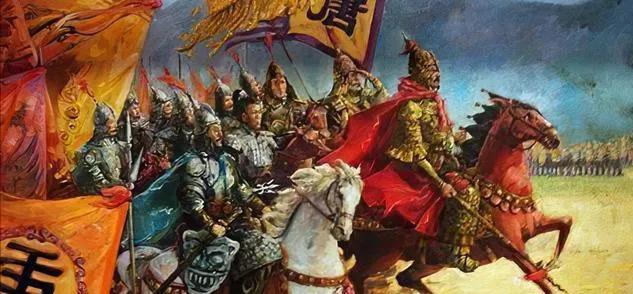During the Tang Dynasty, there was a senior monk in Luling County (present-day Ji'an, Jiangxi Province) with the legal title of "Master of the Three Swords". The Three-Blade Master's common surname is Cao Bolian, his name is Cao Bolian, he is tall, ugly, but he is kind-hearted, helpful, vegetarian and fasting, and devoted to the Buddha.
At the age of eighteen, Cao Bolian resigned from his family and became a monk in Guangzhou, but soon after the Anshi Rebellion broke out, the army was endless, and the south was also destroyed.

Cao Bolian was in a chaotic world, still devoted to the Buddha. He carried a bamboo tube with a scroll of diamond sutras, sat and lay down, recited day and night, and was very diligent.
In November of the seventh year of the Tang Dynasty, the war was tight, and Cao Bolian, a monk who had already become a monk, was forcibly arrested. After arriving at the barracks, because of his tall and fierce appearance, he was soon promoted by his superiors to the rank of battalion general.
Although Cao Bolian was promoted, he was kind in nature and did not like the life of the military camp of fighting and killing at all, after some thought, he resolutely gave up his position and escaped from the military camp in the dark of night, planning to continue to be a monk in the mountains.
At that time, the military situation was urgent, and Cao Bolian's escape was soon discovered by the last time. The boss was furious and immediately sent someone to draw a picture and post a notice to arrest him at the place where the major intersections were about to rush.
In the end, Cao Bolian was arrested by the military camp in a place called Yangkou in Luling, and Liu Ning, the officer in charge of the arrest, ordered that Cao Bolian be beheaded in public in a place called Zhumuqiao to set an example.
At the time of the execution, a strange thing happened, the executioner slashed three times in a row with a knife, and all three steel knives were broken, but Cao Bolian was unharmed. The executioner was stunned, and Liu Ning, who was supervising the beheading, was also stunned.
After a while, Liu Ning asked Cao Bolian, "Do you know how to demonize?" Cao Bolian replied truthfully, "I was a monk before I joined the army, where will there be any demon law!" I have been a Buddha since I was a child, and the bamboo tube I carried with me was a scroll of Buddhist scriptures, which I recited day and night, and I had no intention of joining the army, but I was forced to go to the military camp. I was born cowardly and afraid of humiliating the army, so I fled, and I hoped that the adults would see clearly. ”
Liu Ning listened and asked Cao Bolian, "Since this is the case, where are the bamboo tubes and Buddhist scriptures you carry with you now?" Cao Bolian replied, "Just now I was arrested by a few small soldiers, struggling, and left on the road." ”
Liu Ning said to his soldiers, "Look for him on the way to arrest him and see if there are any bamboo buddhist scriptures!" Several people went back to search, and sure enough, they found a bamboo tube hundreds of steps away, and sure enough, there was a scroll of Buddhist scriptures, which was the Diamond Sutra.
Liu Ning took the bamboo tube and carefully observed it, and found that there were three deep knife marks on the bamboo tube, and the bamboo tube was almost cut. Liu Ning pondered for a while, returned the bamboo tube to Cao Bolian, folded his hands and said in admiration: "The Buddha's power is incredible." ”
Then Liu Ning said to Cao Bolian, "Since you are devoted to the Buddha, this official will let you go. A few days later, Liu Ning wrote the original chapter of the incident that happened to Cao Bolian and played it to Emperor Tang of Tang.
When Emperor Tang Daizong heard of this strange story, he was also greatly shaken, and immediately ordered Cao Bolian to be crowned "Master of the Three Swords" and made him the abbot of Longxing Temple in Luling County.
Cao Bolian did not die this time, and he also received the emperor's imperial title of Fa, which can be described as a blessing, he was grateful for the grace of the Buddha, practiced harder, and achieved more refined Dharma attainments, and was praised as a generation of senior monks. Many years later, the Three Swords Master died peacefully at Longxing Temple.